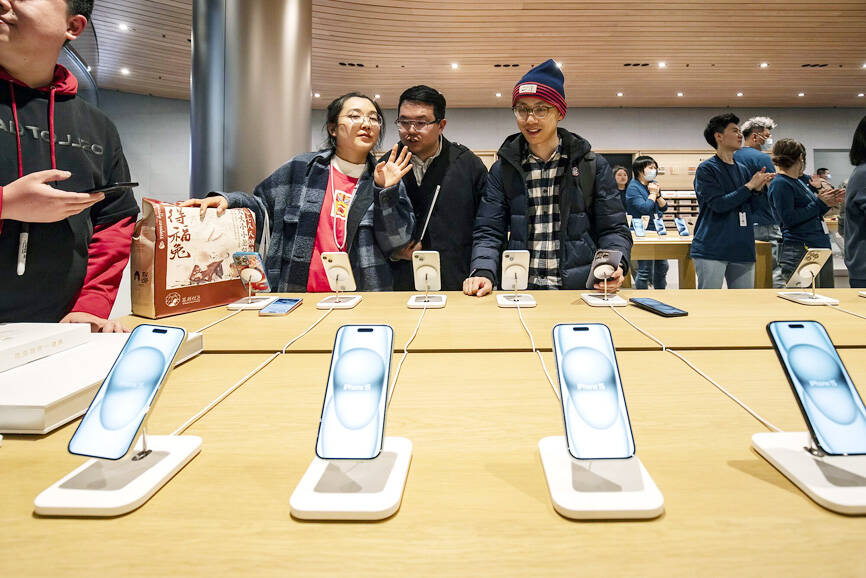Apple Inc’s iPhone shipments stabilized in the June quarter as the wider smartphone market accelerated its growth, independent research showed.
Global smartphone shipments rose 6.5 percent year-on-year, International Data Corp (IDC) said, while Counterpoint Research figures showed that sales to consumers increased 6 percent.
Aggressive discounts around China’s “618” shopping festival helped entice consumers in the world’s biggest mobile market, where Xiaomi Corp (小米) and a resurgent Huawei Technologies Co (華為) have been making inroads this year.

Photo: Bloomberg
The new research adds to data from Chinese authorities showing the iPhone staging a recovery since March.
Apple shipped 45.2 million handsets in the second quarter, a 1.5 percent improvement from the same period a year earlier, IDC said.
Counterpoint’s figures, which address end-user sales, showed a 1 percent decline, and both research groups found the iPhone giving up market share.
Xiaomi was the biggest riser, largely powered by entry-level handsets and emerging markets.
The iPhone has been under pressure in China from local players as well as a government ban on foreign devices at state-run workplaces.
Discounts and the promise of new artificial intelligence (AI) enhancements has helped steady sales for Apple and market leader Samsung Electronics Co, which is also promoting a new generation of phones with AI additions.
“Apple’s momentum in Q2 improved significantly from the negative growth they saw in first quarter,” IDC research director Nabila Popal said. “This is in part due to heavy discounts and promotions in many regions, but also thanks to renewed customer confidence after WWDC [Worldwide Developers Conference] when Apple finally announced its AI strategy.”

NEW IDENTITY: Known for its software, India has expanded into hardware, with its semiconductor industry growing from US$38bn in 2023 to US$45bn to US$50bn India on Saturday inaugurated its first semiconductor assembly and test facility, a milestone in the government’s push to reduce dependence on foreign chipmakers and stake a claim in a sector dominated by China. Indian Prime Minister Narendra Modi opened US firm Micron Technology Inc’s semiconductor assembly, test and packaging unit in his home state of Gujarat, hailing the “dawn of a new era” for India’s technology ambitions. “When young Indians look back in the future, they will see this decade as the turning point in our tech future,” Modi told the event, which was broadcast on his YouTube channel. The plant would convert

‘SEISMIC SHIFT’: The researcher forecast there would be about 1.1 billion mobile shipments this year, down from 1.26 billion the prior year and erasing years of gains The global smartphone market is expected to contract 12.9 percent this year due to the unprecedented memorychip shortage, marking “a crisis like no other,” researcher International Data Corp (IDC) said. The new forecast, a dramatic revision down from earlier estimates, gives the latest accounting of the ongoing memory crunch that is affecting every corner of the electronics industry. The demand for advanced memory to power artificial intelligence (AI) tasks has drained global supply until well into next year and jeopardizes the business model of many smartphone makers. IDC forecast about 1.1 billion mobile shipments this year, down from 1.26 billion the prior

People stand in a Pokemon store in Tokyo on Thursday. One of the world highest-grossing franchises is celebrated its 30th anniversary yesterday.

Zimbabwe’s ban on raw lithium exports is forcing Chinese miners to rethink their strategy, speeding up plans to process the metal locally instead of shipping it to China’s vast rechargeable battery industry. The country is Africa’s largest lithium producer and has one of the world’s largest reserves, according to the US Geological Survey (USGS). Zimbabwe already banned the export of lithium ore in 2022 and last year announced it would halt exports of lithium concentrates from January next year. However, on Wednesday it imposed the ban with immediate effect, leaving unclear what the lithium mining sector would do in the